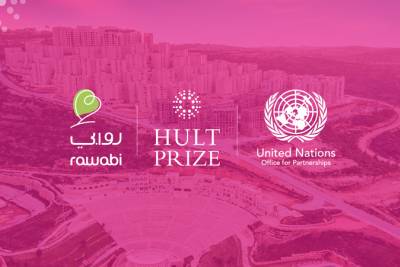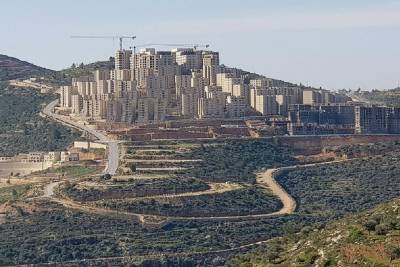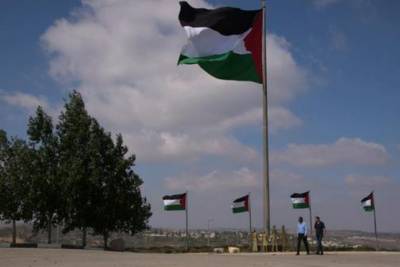RAWABI – PALESTINE’S FIRST PLANNED CITY
City Scape - Palestine’s most ambitious real estate project to date is based on a ‘green city’ concept and will eventually provide a home for 40,000 Palestinians.
After four years of a near standstill, Palestine’s most ambitious real estate project to date is finally able to start moving forward and make first steps towards becoming what its developer envisages Rawabi to be: A new Palestinian destination.
Located 9 km north of Ramallah, Rawabi’s municipal boundaries encompass 6,300,000 square meters of land, which will initially be home to 25,000 residents, housed in 6,000 units. Additional residential and commercial units slated for subsequent construction phases are aimed to ultimately serve a city with a population of more than 40,000.
Bayti Real Estate Investment Company, the developer of Rawabi, which is jointly owned by Qatari Diar and Massar International, is currently developing around one million sqm in the first phase of the project. The company was established with “a mission to create affordable, accessible, family- friendly communities and create several thousand direct and indirect employment opportunities for Palestinians, providing multi-level stimulus to the national economy.”
The masterplan, which was developed by AECOM out of New York in partnership with a local Palestinian workforce, is laid out for development over 20 years.
Ground for the project was broken in 2008 and, despite several hindrances posed by political issues, has made progress with the first two out of a total of 23 neighbourhoods now nearing completion.
This month, 700 Palestinian families will become the first residents of Rawabi City.
A new community
In addition to the housing units, the city will encompass a central commercial area with banks, retail shops, restaurants, cafes, medical facilities, offices, a hotel, a movie theater and three cinemas. The city will also offer eight schools, green spaces, playgrounds, civic services, church and mosques.
Housing consists of 1 to 4 bedroom apartments, ranging from 93 – 340 sqm, with prices set around USD 80,000 – 220,000, depending on size.
Rawabi’s ‘WaDina’ is a 145,000 sqm entertainment area including a water park, soccer field, volley ball field, walking trails, restaurants and cafés, and an impressive outdoor theater. The Romans-style theatre has a capacity for more than 15,000 spectators with a 700-square meter outdoor stage. It is the largest venue of its kind in Palestine and one of the largest in the Middle East, and will eventually see international artists from around the world perform.
The city centre will compose Rawabi’s commercial element for which Palestinian businessman Bashr Al Masri, Chairman of Bayti, has ambitious plans. He wants to create a “Palestinian Silicon Valley,” an ICT hub to attract companies like Google, Microsoft etc. to outsource their businesses there.
In addition to ICT, the “investor-friendly commercial center” aims to provide opportunities for media and entertainment, education, and healthcare. These sectors are expected to create 3,000-5,000 permanent jobs, “leading to a sustainable economy that will drive Palestine’s progress,” says the developer.
Amir Dajani, Deputy Managing Director of Bayti Real Estate Investment Company, adds: “The city centre will be a business incubator. We encourage international firms to work with Palestinian partners. I’m looking for Cisco to put 100 jobs into the city which will help us with capitalising on the young intelligent Palestinian workforce.”
Another unique trait of Rawabi City is its infrastructure, a first in Palestine. Rooftop water tanks (commonly found atop of every building in Palestine) have been completely eliminated. Rawabi’s telephone, electricity and gas lines are all run below ground which lends the city a unique, clean look.
Rawabi Green City
Rawabi is also dedicated to environmental sustainability. The masterplan applies environmentally responsible landscape and development practices designed to preserve the natural features of the landscape.
The vision is to serve as a prototype of the first Palestinian green city and ultimately, “to guarantee a higher quality of life for present and future generations.”
In addition to eco-friendly building features, construction uses a large percentage of recycled materials from Rawabi’s own natural resources. Furthermore, multiple aspects of the residential lifestyle at Rawabi enhance sustainability, including its community gathering spaces and education, health and cultural facilities.
In order to reduce CO2 emissions, public transport within the city is not permitted, however Rawabi will have its own public transport system based on the usage of electric cars. The city also has its own wastewater treatment plant which will collect, treat and reuse reclaimed wastewater.
Contribution to the economy
As previously mentioned, one of Rawabi’s core objectives, in addition to the provision of housing for the middle/upper-middle class, is to provide jobs for Palestinians, to attract businesses and to stimulate the Palestinian economy.
Unemployment in Palestine is high, and the biggest challenge for the private sector is to create jobs.
Whilst Rawabi has already achieved to create thousands of direct and indirect jobs in the construction sector, the challenge is to create permanent jobs in the city itself, Dajani explains. “Our main focus now is to build a small economic embryo within the city, to create 3,000 to 5,000 jobs for teachers, working mothers, entrepreneurs, and the companies that are interested to launch their operations in Rawabi,” he says.
Challenges
Since Rawabi’s inception in 2008, which was born out of the Palestinian Investment Conference held in Bethlehem, the project has had to overcome numerous obstacles.
“A project of this size often faces challenges. Some of these challenges are related to Israeli-Palestinian politics and others are related to Palestinian-Palestinian politics,” says Dajani.
Commenting on the Palestinian-Palestinian politics, Dajani says that the Palestinian Authority’s (PA) commitment to facilitate 140 million dollars for the financing of the project’s offsite infrastructure such as public services, schools, water lines, roads, wastewater management etc. has never materialised and that Bayti was forced to meet the additional costs.
With regards to the Israeli-Palestinian politics, Dajani says that Bayti has been dealing with two key issues: Water and access & movement. According to the Oslo Agreement, Israel controls all of the sources of water coming into the PA. Water is provided to the PA through a quota “which is often inadequate,” Dajani says.
The Joint Water Committee (JWC), an Israeli-Palestinian vehicle, is responsible for the approval of the water needs in Israeli settlements (Israeli projects in the West Bank) and in Palestine.
“Our application for the provision of water was not approved because of the JWC not meeting. Only about two weeks ago we received a notification that we have been allowed to connect to a source of water near Umm Al Safa. After four years of waiting, we’ve only received clearance now.
“This means that we are finally able to deliver the units to their occupants which was a major stumbling block holding the project from progressing and allowing us to deliver units to the potential buyers, thus representing a major breakthrough,” Dajani explains.
Commenting on the issue of access and movement, Dajani says: “Rawabi will eventually be home to 40,000 inhabitants, therefore we will require a safer network of roads into and out of the city. We have requested to get permission to widen the road to Rawabi which will become necessary as the city grows. Unfortunately, until today we have not received the approval for this.”
A segment of the current road leading to Rawabi travels though area C, and any amendments to it thus require Israeli approval.
Following the Oslo Agreement, the West Bank was divided into three administrative divisions: A, B and C. The distinct areas were given a different status, according to the amount of self-government the Palestinians would have over it through the PA, until a final status accord would be established. Area A means full civil and security control by the PA, Area B means Palestinian civil control and joint Israeli-Palestinian security control, while Area C refers to full Israeli civil and security control.
The way ahead
Dajani says that it has been absolutely challenging to deal with non-tariff barriers, which is something likely to continue in the future. “We are relatively under occupation and the facts are that we are without an airport and without a port, hence access & movement, raw material, limitation of supply of materials etc. are obviously outside of our control.
“In a nutshell, with a project of this size, the magnitude and scale of the challenges facing the developer are enormous, however Mr. Masri and his management team as well as every worker in this company is resilient and determined to make this project happen,” Dajani comments.
And Bayti’s activity is not limited to Rawabi. Dajani says that the company is very shortly embarking on building a USD 300 million project in Jerusalem, comprising of 400 apartments in 8 towers with 20,000 sqm commercial retail space and a 5,000 sqm private school. What Dajani says is the biggest real estate development in East Jerusalem since 1967 “was almost impossible to negotiate with Israel.” However, the project has now been approved by the municipality and construction will commence in couple of months.
Rawabi’s wastewater treatment plant (WWTP)
Rawabi’s wastewater treatment plant, which will collect, treat and reuse reclaimed wastewater, sits on a 3.5 acre plot northeast of the city. Underground wastewater collection pipes run downhill from Rawabi to the treatment facility site, eliminating the need for pumps. The treatment site is accessed by a dedicated 1.5 kilometre road, construction of which has recently been completed.
Water treated is refined to a level of 10/10/10 mg/litre for the following elements: Biological Oxygen Demand (BOD), Total Suspended Solids (TSS) and Nitrogen (TN).
As water is treated and tested, it will then feed into separate reservoir. This reservoir is connected to an underground pipeline dedicated exclusively for the transmission of treated water to irrigation pipes in parks and green spaces and for use in agriculture. The reclamation of treated wastewater is part of a national water consumption reduction plan established by the Palestinian Water Authority for the preservation of scarce water resources in the region.
Rawabi’s Phase One wastewater treatment plant will serve the first phases of residential occupancy.
To view original article, Click Here.



